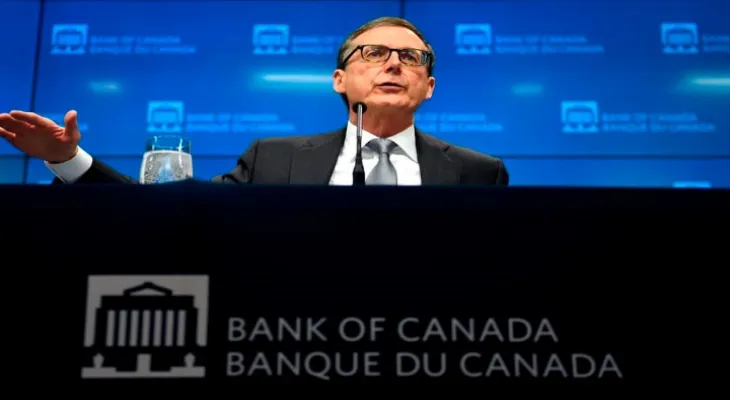Search here
Newspaper
Search here

Arab Canada News
News

Published: October 27, 2022
The Bank of Canada raised the key interest rate by 50 basis points to 3.75 percent on Wednesday. As the inflation battle continues, Canadians are feeling financially strained. Large interest rate hikes by the Bank of Canada are not only a concern for economists and homeowners, as a recent survey showed that uncertainty over rising interest rates is driving Canadian financial anxiety to new highs. However, experts say there are steps you can take to ease the burden as debt becomes more expensive and mortgage costs increase. Also, the central bank made a 50 basis point increase in the interest rate on Wednesday, another big move and the sixth consecutive hike this year, representing one of the fastest rate tightening cycles in its history. The bank raised interest rates to increase borrowing costs and curb spending demand in an effort to take some strength out of the economy and cool inflation, which remains well above its 2 percent target. Additionally, Bank of Canada Governor Tiff Macklem acknowledged in a Wednesday press conference that high interest rates contribute to the burden faced by Canadians amid rising inflation rates. While hinting that the end of rate hikes could be on the horizon, he was clear that rates have not yet reached where they need to be – saying that the risk of not raising them enough could be a more painful option in the long term, adding: "We know that adjusting to higher rates is difficult for many Canadians. We are closely monitoring this impact. But unfortunately, there is no easy way out to restore price stability. If we don't do enough, Canadians will continue to bear the hardships of rising inflation." Concern about rising rates has reached new highs in the regular poll conducted by the MNP Institute on the financial situation of Canadians. Similarly, the Debt Insolvency poll conducted by Ipsos in early September earlier this week showed that six out of 10 Canadians (59 percent) are worried about the impact of rising interest rates on their financial resources, which is one percentage point higher than the previous quarter’s survey. Grant Bazian, president of MNP, told Global News this is the highest level of concern about rates since the survey began in 2017, although he noted this is not necessarily surprising as rates have largely been low while present. He also stated that for many young Canadians entering a cycle of rising prices for the first time as they try to establish their families and careers, this concern is completely new, saying: "They are uncertain about how it will affect their lifestyle, spending habits, what they can afford in the future, and their savings. I think there is a lot of anxiety and unknowns; this is the main issue here." Bazian added that younger Canadians are likely to form two groups expressing the most concern about rising rates: renters and low-income families. Furthermore, the survey showed that 59 percent of renters fear being in financial trouble with rising interest rates, compared to 41 percent of homeowners. About 60 percent of Canadians with household incomes under $40,000 feel concerned about repaying their debts, compared to 51-52 percent of those earning more, and rising interest rates make debts like credit cards, some loans, and mortgage products more expensive to afford. While renters may not have a mortgage to worry about, Bazian says the sentiment survey embodies the lack of security and control over their financial resources. He notes that renting families may face sudden payment increases if they have to move or lack control over rents. With a booming rental market, the costs of obtaining a mortgage in Canada are also significant. The mortgage interest cost index at Statistics Canada rose by 8.3 percent in September, marking the third consecutive month the measure rose year over year. While fixed-rate mortgage holders feel the pain of high rates when renewing, variable products see payments rise immediately in close correspondence with Bank of Canada rates. An analysis by the comparison site rate.ca showed that variable-rate products will pay an additional $28 per month for every $100,000 of mortgage with each 50 basis point step like those Canadians saw on Wednesday. A homeowner renewing their mortgage today will see an average increase of 18 percent on their monthly payments, according to the site. For those feeling “taken advantage of” by rising payments, they will have no choice but to lock in a fixed rate, they say. For those who can endure more short-term pain, Tran likes the flexibility variable rates offer, i.e., the penalty for breaking a variable mortgage is always three months' interest, while fixed rates can have more costly fees linked to early exit. He also points out that historically, the average variable-rate mortgage ends up being less expensive than its fixed-rate counterparts. Tran argues: "As long as you are comfortable with a bit of risk, the variable rate may remain beneficial for some people." Whether you are trying to contain bloated mortgage costs in your family's finances or looking for ways to earn a few extra dollars each month, Bazian says budgeting is always the right starting point, adding: "Many people don’t know what they spend their money on. They usually know how much money they earn, rightly so, because that paycheck comes once or twice a month. But what do they actually spend it on?" Bazian argues that dividing annual expenses like car insurance and even holiday shopping into monthly parts can make regular costs more digestible and can reveal where there is room to cut back or switch to a cheaper provider or grocery store. Nearly a year after inflation rates and interest rates increased, he noted that many Canadians may have already cut back as much as they can. If debt costs get out of control, he recommends talking to insolvency trustees just to learn about available options to reduce or eliminate debt.
Comments